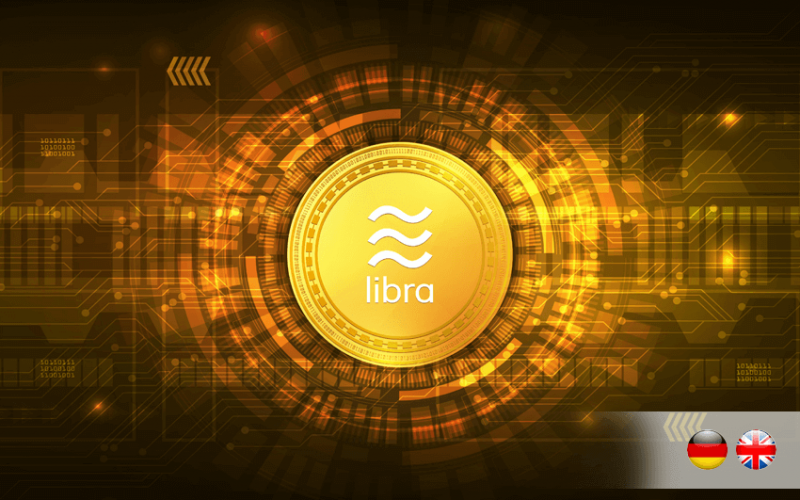…also for people who have so far not looked into blockchain…
Table of Contents
What is the Libra cryptocurrency?
Facebook has announced, in conjunction with other companies, that it will issue its own Libra cryptocurrency. It is remarkable that so many very large companies, some of which are competitors, have joined forces to do this. Their aim is to turn the Libra cryptocurrency into a global currency. They have published their plans in a so-called white paper.
What is a cryptocurrency?
A cryptocurrency is a currency based on blockchain technology. When a Libra is issued, a transaction is executed on the Libra blockchain. The blockchain is like a type of bookkeeping system as it stores how many Libra have been issued and to whom or to what address. However, this bookkeeping process does not take place on one computer, but on many simultaneously. This means that there is no central location, but all participants in the blockchain have a decentralised copy of it. With the Libra cryptocurrency, however, not everyone who downloads the software can participate in the network, as is the case with Bitcoin, for example, but only those who have been permitted to participate. Libra is therefore a so-called “permissioned blockchain” because permission is required to participate.
Who can participate in Libra?
The Libra blockchain is designed in a way that only certain permitted members can participate in the blockchain. Members must have 10 million USD, a certain amount of computing capacity on servers and fulfil other requirements; in particular, they must have reach or relevance for payments. “Grants” for charitable organisations are also possible. Initially, only up to 100 members will be accepted. The plan is to make the Libra blockchain accessible to everyone at a later date. However, it is still unclear how this will work.
Each permitted member operates a so-called “validator node”. This is a part of the blockchain network that validates a transaction according to an agreed protocol. Based on the validation, a transaction is then authorised in the blockchain, e.g. the issuance of a new coin of the Libra cryptocurrency. Libra coins only exists on the computer (however, this is the same for scriptural money), there are no notes or coins. The value of a cryptocurrency therefore usually results from the fact that its issuance is limited and that people exchange it and thus attach a value to it. This value can fluctuate a lot, as can be seen with Bitcoin (see also Steffen’s article on “losses in value of cryptocurrencies”). In order to avoid this volatility, the Libra cryptocurrency is set up as a so-called “stablecoin”.
What is a stablecoin?
A stablecoin is a crypto coin that is linked to a fiat currency (e.g. USD, EUR, GBP). For example, if a crypto coin is linked to the dollar, then one crypto coin should always have the value of one dollar. Companies issuing stablecoins promise to put one dollar in reserve for each crypto coin issued. For example, this is said to be the case with the cryptocurrency Tether. However, for some time now there have been doubts as to whether this is actually the case, so that a Tether is now worth less than a dollar because the market has lost confidence in it.
However, the Libra cryptocurrency is not intended to be linked to a single currency, but to a basket of currencies (USD, EUR, YEN, etc.). The older readers among you may remember the ECU (European Currency Unit), where that was also the case. In order to hedge certain risks connected with the Libra cryptocurrency, actual deposits in various currencies will be made with banks and government bonds will be bought. This will ensure the Libra is stable as actual assets will be used to back it up, but the value is not tied to a single currency. The Libra cryptocurrency is therefore not a proper stablecoin, which always has the value of its reference currency. There will be value fluctuations, depending on how the Libra develops in comparison to the respective fiat currency which is used for the purchase/sale.
Who manages the reserves for the Libra cryptocurrency?
A Libra Association was founded in Switzerland to manage the money reserves for the Libra cryptocurrency. Its members are the founding companies and the intention is to include further companies in the future. Facebook is one of them, but it has the same share as all the others and therefore cannot dominate the Libra Association.
How do I get Libra?
You need a crypto wallet in order to hold a crypto coin. Crypto money is always assigned to an address. This allows you to check on the blockchain where the crypto money is, but not who holds it. This remains anonymous. The address is a so-called public key that encrypts a transaction. In addition, the owner of the public address holds a key with which he or she can authorise a transaction, the so-called private key. The public key is public, just like an address, which can be used to send Libra to. Only the holder of the private key can get Libra out of the wallet again, i.e. sell or transfer it. However, if the private key is lost, the public key can no longer be decrypted and the Libra assigned to that address are lost as well. There is no password recovery process. This will likely lead to practical problems if the Libra cryptocurrency is used widely.
Facebook’s wallet is called Calibra. The plan is to integrate it into WhatsApp and Facebook Messenger. It can be assumed that this will be implemented in such a way that it will be easy for users to get a wallet and therefore acquire and use the Libra cryptocurrency. In order to get Libra, you will pay the corresponding value in the respective fiat currency, with a surcharge for executing the transaction. In the white paper, Facebook states that this surcharge will be small but designed to prevent abuse. No doubt, one advantage of Libra is that the global spread of Facebook’s services can quickly lead to a widespread use of the Libra cryptocurrency.
In order to open a wallet in Calibra, anti-money laundering checks will be carried out.
How do I change the Libra cryptocurrency into a fiat currency?
The exchange of Libra – like other cryptocurrencies – will take place on crypto exchanges. It will be interesting to see how much the exchange will cost.
What can I buy with the Libra cryptocurrency?
Nothing at the moment. However, there are some large companies among the founding members, such as eBay, Spotify and Uber, where you can probably pay with Libra in the future.
In future, the Calibra app will have a functionality which will allow users to easily send Libra via their mobile phone. A system similar to WeChat is also conceivable, where a QR code is scanned, giving the buyer the address in a simple way to effect a payment in the Libra cryptocurrency to the seller.
Big bang or bluff?
This is anyone’s guess at this stage. Due to the fact that so many large companies are involved, the Libra cryptocurrency has the chance to become successful because access via the apps operated by Facebook is very easy. With the help of the other members, an ecosystem can also emerge in which applications can develop.
At the same time, however, the project is faced with the challenge that trust in Facebook has suffered greatly due to the data scandals of the recent past. In addition, the interests of the network’s members cannot be aligned in all aspects and maybe some only participate to learn about or slow down what could ultimately undermine their current business model.
Is all this permitted?
The regulatory requirements to be fulfilled by the Libra Association, Calibra or the members are not yet all clear and, judging by the initial reactions of politicians and central banks, they are likely to increase in the future. We will keep you updated regarding everything Facebook et al need to be aware of and the challenges ahead.
Cover picture: Copyright © fotolia / KanawatVector





Thank you Dr. Susanne Grohé for a good explanation of cryptocurrency.
Cryptocurrency analysts had warned of the potential for a steeper sell-off, and now merchants are questioning when and the place the market shakeout would possibly finish.
This was a delight to read. You show an impressive grasp on this subject! I specialize about Website Traffic and you can see my posts here at my blog Webemail24 Keep up the incredible work!
Your posts stand out from other sites I’ve read stuff from. Keep doing what you’re doing! Here, take a look at mine Seoranko for content about about Data Mining.
The way you put together the information on your posts is commendable. I would highly recommend this site. You might also want to check my page ArticleHome for some noteworthy inputs about Food Delivery.
Nice post! You have written useful and practical information. Take a look at my web blog Autoprofi I’m sure you’ll find supplementry information about Auto Export you can gain new insights from.
Having read your blog, you obviously know what you are talking about. I’m sure visiting my page Articlecity about Private Investigators Agencies will be worth your time!
Wow, this post has given me useful info and answered some of my questions. I hope to give something back and aid others like you helped me. Feel free to surf my website Articleworld about Rice.
I know a lot of folks whom I think would really enjoy your content that covers in depth. I just hope you wouldn’t mind if I share your blog to our community. Thanks, and feel free to surf my website Article Sphere for content about Gold and Silver.